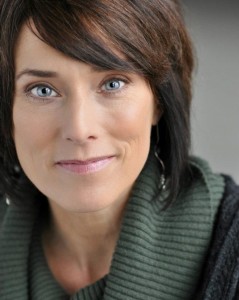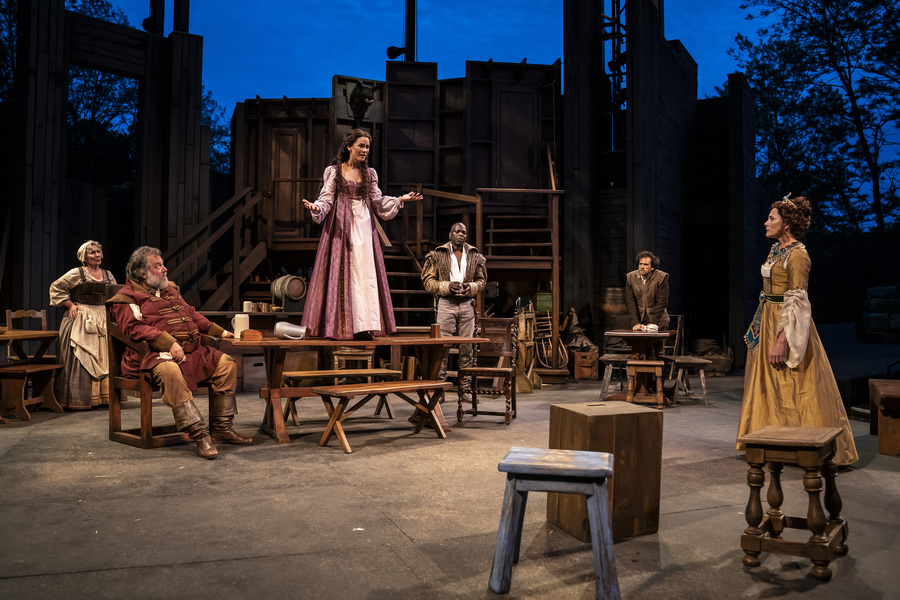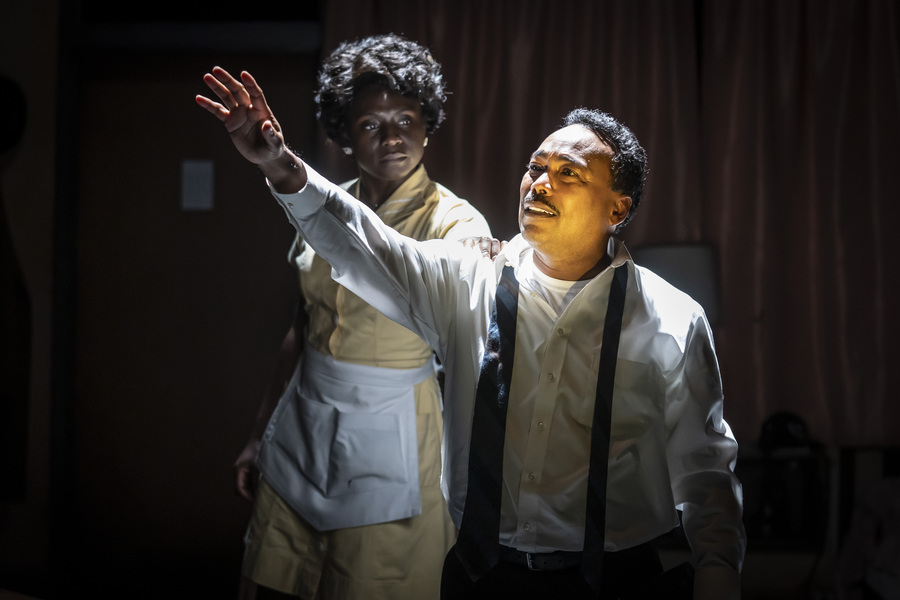Making the journey upstate to American Players Theatre is a favorite pastime of thousands of arts lovers in Wisconsin. Nestled in the endless rolling hills of Spring Green, the theatre typically sees thousands of patrons under the stars every season. Pre-show picnics are a must, complete with local vittles, wine, and much-needed complimentary insect repellent.
Last summer they had to skip their season altogether, and this year, though they’re back, things are a little different at American Players Theatre, which opened its summer season on May 14 with Katori Hall’s The Mountaintop in their indoor Touchstone Theatre. But instead of welcoming 5,000 guests over the course of the run, they’ll only have capacity for 1,300. Their outdoor season begins this week at their Hill Theatre with James DeVita’s An Improbable Fiction, which typically seats 1,089 but at the moment is only selling 25 percent of that number.
“When we started talking about outdoor theatre, there were a lot of unknowns,” said APT’s production manager, Michael Broh (he/him). “Operating at a 25 percent capacity, what is that going to mean for the actors who are used to performing for an audience of 1,000-plus people? Will it suck the life out of the show? And, what does it mean to not have them in rep so that we don’t have actors possibly infecting each other during rehearsals?”
The road to reopening at American Players has been filled with questions, meetings, and discussions about how to keep artists and audiences feeling safe and healthy. Outdoor theatres already have a special set of considerations compared to other theatres: They must be concerned with wayfinding, landscaping, temperature regulation, durability of sets and costumes, and more.
After a harrowing year filled with uncertainty about how theatres operate, who theatre is for, and why theatre matters, the team at APT had to completely rethink all these processes. In addition to limiting audience capacity, they are also producing six shows instead of the usual nine. And they also almost completely changed the show selection for the 2021 summer season.

“Since last April, everything has been like a desert island,” said artistic director Brenda DeVita (she/her). “It’s been like we have a stick, a stone, and some twine. What are we doing? Normally, we have 45 actors come and 200 people descend on this town, but there wasn’t any capacity for housing and the union [Actors’ Equity Association] was not in a place to provide guidance. So we asked, what can we do with less than eight people that we’re passionate about?”
For now, all artists are wearing masks in the shops and in the rehearsal rooms. Events, including pre- and post-show discussions, will all be virtual. DeVita said that they’ve also strongly encouraged the entire staff to get vaccinated, so that everyone can “come back to listen to a story.”

Vaccination has also been key for Utah Shakespeare Festival. Executive director Frank Mack (he/him) said that the director of the Southwest Utah Public Health Department wrote them a letter guaranteeing vaccinations for the entire company back in February. Utah Shakes was fully prepared to become a vaccination site for their region, since the theatre employs about 300 people per season, but by the time they went into pre-production, virtually everyone arrived already fully vaccinated.
Unlike APT, Utah Shakes is producing a full season of eight plays and selling every seat. Six of the eight shows are carried over from the canceled 2020 season: Pericles, Richard III, and The Comedy of Errors open on June 21, 22, and 23, respectively. Mack says that they’re hoping that by the time they open the remaining five productions in their season, audiences will be able to enjoy them without masks.
As a destination theatre, they’re used to people coming from nearby Salt Lake City, as well as Nevada, California, and even internationally. While they refunded season tickets after canceling the 2020 season and were initially concerned about whether audiences would be ready to come back to the theatre this year. That worry was short lived.
“We’re selling tickets now at about 80 percent of where we would be in a normal year,” Mack said. “It’s kind of an inversion, because normally we’re sitting around here trying to convince people. Last year, people wanted to see plays and we didn’t have plays for people to come see. Now it’s in sync. We’re trying to persuade people, and they’re really excited about seeing plays.”
None of the theatres I spoke to have outright required vaccination, but all strongly encourage it. Some have even partnered with local health departments to give away tickets as an incentive for vaccination. Actors’ Equity guidelines allow for more freedom to operate for fully vaccinated casts and crew members.
Working out kinks with Equity has been a pain point for many theatre leaders, actors, and stage managers. Murmurs have become shouts from members who are feeling left in the lurch regarding access to healthcare and retirement benefits in the absence of work weeks. And many theatres across the country have still not announced a season due to the everchanging, expensive, and sometimes conflicting guidelines from the Centers for Disease Control and Prevention, Equity, and local ordinances.
“I feel that, more than anything, our union has held us back from moving forward,” said Gavin Lawrence (he/him), a company member at APT. He is portraying Martin Luther King, Jr. in their production of The Mountaintop, with his wife Sola Thompson plays opposite him as the mysterious housekeeper, Cammae. “Normally, since we do shows in rep, we have various shows in rehearsal at once so the whole place is usually filled with people and energy and there’s a sense of unity and common purpose. With The Mountaintop having a cast of two we felt pretty isolated, almost like we were rehearsing on a deserted island. Very surreal.”

Miles away in New England, Valisia LeKae (she/her), who was nominated for a Tony Award for her role as Diana Ross in Motown: The Musical, is preparing to play the title role in Nina Simone: Four Women at Berkshire Theatre Group. In July, she’ll be leaving home for seven weeks for the first time in almost two years to start rehearsals. Though the play will be staged in the courtyard of the company’s Unicorn Theatre, she shares Lawrence’s excitement and hesitation for a return to the stage and performing for a live audience.
“I’m now going to be sharing a space with three sisters and we’re going to have to look out for each other,” said LeKae. “I’m going to be amongst a larger crowd…I feel safer outside. I don’t know if my soul is ready today, and I’m not sure if it will be in July or August, to be indoors with people. I appreciate being able to take it one step at a time.”
Artistic director Kate Maguire (she/her) and the team at Berkshire Theatre Group have leaned into the unknowns of the past year, and have never stopped producing live, in-person theatre, cancelling all the shows in their 2020-21 season but still producing Godspell in a tent. Maguire said that she felt that a light-hearted story about individuals coming together for healing was necessary in light of COVID-19. They could only have 50 people in the audience, all socially distanced, and they sold out performances.
“I was on the phone almost daily with Equity,” Maguire recalled. “The actors were extraordinary with keeping each other safe. They quarantined before they arrived and after. The staff and actors were tested frequently. Our rules were strict like the NBA.”
After the success of Godspell, they produced Holiday Memories by Truman Capote, also in the tent, despite temperatures in their area dropping down to negative 13 degrees. She was prepared to cancel performances, but the actors were enthusiastic and the entire audience still showed up.
Now, as they’re preparing to open The Importance of Being Earnest on June 18, they’re trying to work through the best way to scale up audience size. They’ll need to go from 125 to 200 seats under the tent, and square away logistics at three different performance spaces (a mainstage tent, a parking lot tent, and a lawn space).
“We’re asking a lot of questions of ourselves and our audiences,” Maguire said. “We encourage mask wearing but we can’t require them. We thought about going indoors in August. I’m hoping we can go back indoors in October. We’re also making sure that all of our internal systems are working in the best way possible to purify the air for everyone.”
Scaling up is also on the minds of artistic director Rick Dildine (he/him) and executive director Todd Schmidt (he/him) at Alabama Shakespeare Festival. The space has one outdoor and two indoor venues, and they will be starting the season outside in September. Producing the world premiere of Shoebox Picnic Road Side: Route One by Deneen Reynolds-Knott seems like the perfect way to open the season, since the play itself is set outdoors. It tells the story of a Black family from Harlem in the 1950s, packing meals in shoeboxes as they head South to visit relatives, since restaurants there will not serve them.
There’s just one catch: The show requires the actors to eat as well as interact with the audience throughout. And it allows for the audience to eat as if they are sharing a meal with the fictional family in the script. Whether Equity guidelines will allow for such a scenario by opening night on Sept. 16 remains a mystery.
“I want people to feel safe, comfortable, exited and confident mask free to laugh and not worry,” said Dildine. “I want actors and artists to feel comfortable and confident in the rehearsal process.”
Schmidt added, “I want us to be fully embraced by everyone in Montgomery and continue to expand our reach to the community.”
Whether we break bread at a show or not, only time will tell how quickly we can return to the communion of theatregoing.
Kelundra Smith (she/her) is a contributing editor to American Theatre magazine. kelundra.com


